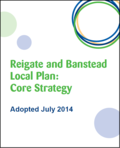Welcome
Welcome to our new look Planning Policy newsletter! We will be using this newsletter to keep you updated about the work that the Policy Team is doing, current planning policy issues and public consultations. In this issue we have a message from the Council Leader, Cllr Victor Broad, about the importance of planning policy and how decision making on planning applications takes place. You can also find out more about the Community Infrastructure Levy (a new charge on development, which will start being collected in the borough from 1 April 2016) and our progress on the Development Management Plan.
We’d love to hear what you think of our newsletter – you can find our contact details at the bottom of this email.
Received this by post? We can keep in touch with you more quickly and easily using email. If you received this newsletter by post but have an email address, let us know so you can receive this by email next time.
Message from the Council Leader, Cllr Victor Broad
 Planning is a hot topic. As Councillors, it is probably the main issue residents contact us about. I understand this. Residents, whether buying or renting their home, are invested in the borough and want to see the things that make it a great place to live protected. I thought it would be useful to briefly explain the Council’s planning processes and allay some of the fears that residents express. Planning is a hot topic. As Councillors, it is probably the main issue residents contact us about. I understand this. Residents, whether buying or renting their home, are invested in the borough and want to see the things that make it a great place to live protected. I thought it would be useful to briefly explain the Council’s planning processes and allay some of the fears that residents express.
The Council’s responsibilities
Surprising though it may seem, any person or company can submit a planning application on any piece of land. Some developers do this speculatively, in the hope of persuading residents to sell their properties, for example, when large gardens present an opportunity for more homes. When a valid planning application is submitted, the Council is required to determine it. We have a clear procedure in place to ensure that the decision making process is open, transparent and democratic.
The planning application decision making process
The planning process is highly regulated. All planning applications are subject to, and determined in accordance with, planning law and the Council’s adopted planning policies. Minor schemes, such as property alterations are normally dealt with by planning officers under delegated authority. Larger or more controversial applications are referred to the Council’s Planning Committee. This Committee is selected each year, with its membership determined by the political make-up of the Council. It comprises 16 elected members, representing the different parts of the borough. The Planning Committee is a quasi-judicial, independent Committee, who make their own democratic decisions free from any Council Executive or other outside influence. Sometimes, the Council itself is involved in development proposals, where these provide an opportunity to promote or improve the economic, social or environmental well-being of the borough. Working in partnership with developers and community representatives on large scale development proposals gives the Council influence and control to make sure that these large schemes are well designed and reflect local priorities. The Council may on occasion apply to itself for planning permission, making it even more important that the Planning Committee acts transparently and fully independently of the Council’s Executive. It is for this reason that no member of the Executive is a full member of the Planning Committee and that all Planning Committee meetings are held in public. They are also webcast. The role of planning policy
So where does Planning Policy come into all of this? Along with planning law and national planning rules, our local planning policies are used by planning officers and the Planning Committee to assess planning applications. Unless there are clear and justified reasons not to do so, all planning applications will be decided in accordance with planning law and adopted local planning policies and land allocations. Most of the policies that the Planning Committee use to decide applications were put in place in 2005 or before. The Development Management Plan consultation later this year will explain how I and the Council’s Executive want to update these planning policies and where we want to see development activities focused in future years. Updated policies and land allocations will provide more certainty for everyone, and the Development Management Plan will be the main tool that is used to assess planning applications in the future. Public consultation will be a central part the process - so I urge you to register your interest to get involved and follow our progress through future Planning Policy newsletters. Cllr Victor Broad, Leader, Reigate & Banstead Borough Council
Community Infrastructure Levy
From April 1, the Council will start collecting the Community Infrastructure Levy (CIL).
CIL is a new charge which councils can collect from new development. The money collected can be used to help pay for local infrastructure and services to support existing and new homes, businesses and residents. The Council can decide what to spend the CIL it collects on, which may include schools, roads, public transport or community facilities.
The CIL charge in Reigate & Banstead will apply to new residential development and new convenience retail development (such as supermarkets).
Any planning applications determined after April 1 by the Council may be liable for CIL, even if they were submitted prior to commencement of the charge. For further information and advice about CIL please see our website or email us.
The Development Management Plan  In 2014, the Council adopted Part 1 of its new Local Plan, the Core Strategy. The Core Strategy sets the overarching framework for planning and development in the borough, including the scale and broad location of growth. In 2014, the Council adopted Part 1 of its new Local Plan, the Core Strategy. The Core Strategy sets the overarching framework for planning and development in the borough, including the scale and broad location of growth.
See our previous newsletter to find out more about what the Core Strategy means for your area.
We are now working to prepare Part 2 of the Local Plan, the Development Management Plan (DMP). This will include the planning policies that translate the Core Strategy proposals into ‘on-the-ground’ proposals.
The DMP will comprise three main things: - Updated policies - These will guide decision making on planning applications. These policies will cover issues such as open space, nature conservation, heritage, design and parking
- Updated planning designations - Planning designations highlight areas with particular characteristics where a specific policy approach is necessary. Examples include Urban Open Land, Sites of Nature Conservation Importance, Employment and Retail areas, and Residential Areas of Special Character
- Site Allocations - Sites will be allocated for specific types of development (for example, housing, offices, new shops)
We will consult on our initial proposals for the DMP in late Summer 2016. If you would like to be kept informed and you are not already on our mailing list, please email us. You can view the full DMP preparation timetable (known as the Local Development Scheme) here.
Information gathering
We are in the process of gathering more information on a number of topic areas: Transport modelling - Understanding the transport impact of new developments is very important. We are working with Surrey County Council to understand how our road networks and public transport services might be impacted by new development and how we might manage future pressures.

Traveller needs - The Council is required to plan for a variety of different housing needs, including accommodation for gypsies, travellers and travelling showpeople. The Council has commissioned an independent consultant to carry out a Traveller Accommodation Needs assessment to inform our policy development work. Retail needs - The way people shop is changing. It is important that our town centres policies are flexible enough to reflect this. As part of this work, a market research company is carrying out some household telephone surveys for us. For more information, see our webpage DMP - Current progress
Contact us
Please feel free to contact the Planning Policy Team via:
Email: LDF@reigate-banstead.gov.uk
Tel: 01737 276178
Address: Town Hall, Castlefield Road, Reigate RH5 5TD |